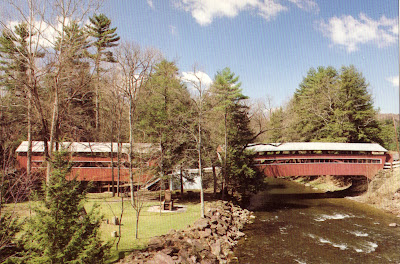The summer that I
was nine I went to camp for the first time.
My mother was tired of having me run in and out whining about nothing to
do. Roller skating was limited on our
street and riding a bicycle was out of the question. The coal trucks rattling down from the
colliery were too much of a hazard.
Somehow she found
out about a summer camp for girls run by two school teachers and situated only
about an hour from Shamokin. So it was
that after we packed shorts and shirts and underwear, sweaters and pajamas --
all with nametags sewn on -- plus toothbrush and comb, soap and soap dish, a
towel and washcloth, letter paper, a book or two and Action comics, we set out
in the car the last week of June for camp.
Camp Ai-Yuk-Pa was
situated on a stream called Fishing Creek in Forks, Pennsylvania. It was to be for six weeks and even though I
always had left home with no qualms, six weeks was a long time. We were both a little nervous about it that
first summer, but as we went across the little covered bridge at Fishing Creek
and turned up the dirt road to the large building where we were to live, I was
more excited than scared. There were
girls of all ages everywhere.
Aunt Sally and Aunt
Til, as the two school teachers asked to be called, greeted us on the big front
porch and immediately introduced me to Dee Dee who would share my locker and
bunk next to me. I hardly said goodbye
to my mother as I rushed around finding locker, bunk bed (first arrivals could
get top bunks) and familiarizing myself with the building.
Upstairs had long
two-sided, sit-down dressing tables in the center of the big room. Around the perimeter were curtained lockers,
one for each two girls, where we kept our clothes. The first bedroom at the head of the stairs
was for Aunt Sally and Aunt Til and there were four rooms with bunk beds and
large screened windows behind the lockers.
Eight to ten girls and a counselor were in each room.
I found myself in
Room 2 (8 and 9 year olds) that first year
and thus began six glorious weeks at Camp Ai-Yuk-Pa
(Indian for the place where happiness is found.)
I went to camp six
summers, made many friends and thrived on our plain living. We slept indoors, had electricity, but going
to the bathroom meant a short trip up the meadow behind the tennis court to a
3-hole johnny complete with honeysuckle vines, bees and spiders. We did not linger here.
Water came from a
pump and was the coldest, sweetest water I've had before or since. We washed in it, brushed our teeth with it and filled our individual tin cups
for drinking and spitting contests. On the first floor was a comfortable living
room with couches, chairs, bookcases, a big fireplace, a piano and a ping-pong
table. There was a communal dining room and kitchen and a screened porch for
handcrafts.
On Thursday night,
we could get in to supper only by handing over a letter or postcard home. Food was wonderful -- plain, delicious and
filling -- cooked by local women from Forks or Benton. Birthdays were observed by a big cake
and candles. I was lucky, being a July
girl. My birthday was always remembered
the second week at camp.
In the bookcases, I
discovered new delights -- the Dana Girl mysteries, some Nancy Drew and Honey
Bunch and Bobbsey Twin books that I hadn't yet read. At rest hour, I could devour these along with
candy (sent from home) which was passed out to the whole room. I always asked my mother for boxes of tootsie
rolls along with the newest comic books and was in awe of the occasional
two-layer box of saltwater taffy sent from Atlantic City by someone's parents.
I learned songs at
camp and we had skits and amateur nights.
I remember one little girl toe dancing to "Wedding of the Painted
Doll" and I once sang "My Little Grey Home in the West." We learned riddles and played games. One year jacks were the big attraction. Aunt Sally and Til sewed all of us little red
gingham drawstring bags for the jacks and ball.
We had Topsy Turvey
day (a clothes on backward and supper in the morning kind of day) and Treasure Hunts. There was softball, tennis, swimming in
Fishing Creek where we also found rocks with delicate fossil imprints, We had hikes up the country roads and down
the railroad tracks where we picked and ate blackberries. There were campfires,
ghost stories, even free time when we could play in the gazebo near the front
porch or go over to one of the little islands in the creek and swing in the
hammocks there.
The counselors were
fun, some not much older than the big girls in Room 4 (the 13 and 14 year olds.) There was Fitch who was the clown. She taught swimming and played taps and
reveille on her bugle. Ruth did games
and took the Catholic girls to mass in nearby Bloomsburg every Sunday. Midge was petite and did sports with us. Millie, sedate and slightly older, played
piano and taught handcrafts. She
suffered through our purple and orange raffia handbags, lopsided stuffed
animals, hammered bookends, burned mottoes and the ever popular gimp whistle
holders or bracelets.
The counselors had
to put up with homesick little ones, the occasional bedwetters, arguments, bee
stings, poor sportsmanship, daredevil girls with ideas of their own and on
rainy days keep 40 campers busy in one building. As I grew older, I appreciated them more and sometimes, in the evening (when I had
graduated to Room 4), some of us with our counselor would go down the dirt road
and across the covered bridge to the little restaurant and store. We would have a coke or giant peanut butter
cup and play the juke box. I took my first puff on a cigarette there.
On the way back
walking up the road in the black silence, we could stare up at endless night
sky, listen to the crickets and watch for falling stars. I learned my first and best ghost stories at
camp.
The only bad memory
I have was my ride on the runaway horse.
Those who took riding (50 cents an hour) would be assigned certain hours
during the day and be excused from regular activities to go riding. My first year we had gentle horses like Rex
and Billy and a patient ex-jockey for a teacher. The second year we had Norm, complete with
cowboy regalia, chaps and all.
In mid-season, we
got a new horse, Napoleon. He was big
and black, 16 hands high and very imperious looking. For some unknown reason, I was given him to
ride and off we went walking at first down the road across the covered bridge
and up the highway to a little dirt side road where we were to canter awhile in
the country.
Napoleon was
anxious to go that day. He had memorized
the trail and decided we were all too slow.
He took off like he had just been let out of the starting gate and he
and I were down the road. I was
panicked. I could not stop him or slow
him down. I lost the reins then the
stirrups and was hanging on the pommel.
Thank God for a western saddle. I
was crying as we raced through a little hamlet past amazed farm people, up the
hill and, finally, down a woodsy incline where he finally slowed down. I slid off and sat on the ground pretty
shaken up.
Napoleon kept on
his appointed rounds and disappeared.
The group caught up to me in a few minutes. Norm was quite annoyed that I had let a
valuable horse get away! He put me on
behind one of the other girls and we went on home -- with me bouncing (forget
posting) all the way. I was sore but
none the worse for wear and was coddled a little that day by Aunt Sal and Aunt
Til. I kept on riding but not on
Napoleon. He had returned to his
starting gate, but was soon retired from camp duty.
My last summer at
camp was the year that I was 14 -- after the war was declared and we moved to Washington. A few years after the war when I was in
college, I wrote Aunt Sal and Aunt Til and asked if I could be a counselor. She wrote back a sad little note and said
that the building had been sold during the war to the Salvation Army and then
subsequently closed.
So ended another part of childhood. Driving up that road in later years, I noticed that everything looked so small and commonplace. The covered bridge and the camp buildings were gone. And so I had to write it all down in order to revisit those good times.









What a wonderful tribute to Sarah Dawes. What an interesting lady.
ReplyDeleteI found this page particularly interesting, as I live in Orangeville (a few short miles south), and I have been collecting old pictures of the area in hopes I can put a book together once I hit retirement. I don't remember this camp or the Beacon Lodge, as I have not been here but 25 years. I knew it as Hickory Joe's, a restaurant, but the gas pumps were long gone. I have several pictures of the Forks Hotel and a suspension bridge over Fishing Creek, these being only hundreds of yards from the Beacon Lodge, and I'd wager Sarah would have seen/remembered these places. I also have a couple of pictures of the covered bridge of which she speaks in her last paragraph, and also other pictures of the camp building on whose stoop they sit in that last picture. It's too bed, because I'd bet she would have liked to see them.
Matter of fact, my father-in-law's cousin owns and lives on the camp property, and it was he who dismantled this building after it had been rendered unsalvageable after a flood.
There was also a general store across the railroad tracks than ran alongside the camp, and it was there during her time, though she did not mention it. And I wonder if the "hamlet" on which she went through on the runaway horse was the town of Stillwater, just north of Forks. I have several old photos of Stillwater, though I doubt Sarah would have remembered the buildings while holding-on for dear life.
Would have loved to have met the lady, and to have had a chance to sit down and talk.
If anyone in her family has any other pictures of the Forks area, I would love to see them. Otherwise, wonderful job with the website.
pbllanso@geisinger.edu